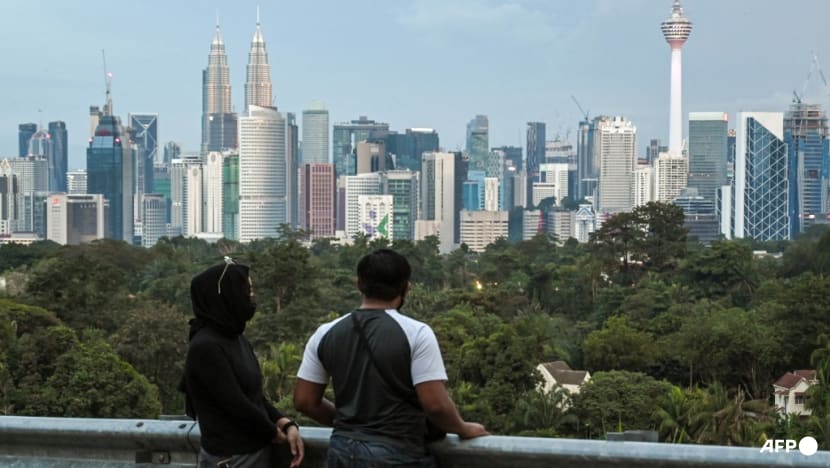Commentary: From sinkholes to K-pop, there’s a growing threat of disinformation in Malaysia
The preservation of free expression is essential in any democracy, but so is protecting society from the damaging effects of disinformation, says Dr Nuurrianti Jalli, Visiting Fellow at ISEAS-Yusof Ishak Institute.

File photo. A couple looks at the skyline of Malaysia’s capital Kuala Lumpur on Oct, 2020. (Photo: AFP/Mohd Rasfan)

This audio is generated by an AI tool.
STILLWATER, Oklahoma: What do Blackpink’s Rose, a coastal town in Perak and a sinkhole in Kuala Lumpur have in common?
All of them were recently at the centre of disinformation in Malaysia, no thanks to the viral nature of social media.
In August, after a tourist fell into an 8m-deep sinkhole in Kuala Lumpur and disappeared, false claims surfaced on social media alleging that the city was built atop a “giant cave” and was unsafe for residents and visitors.
A viral TikTok post even tagged this content as “AI-generated news for entertainment” accompanied by manipulated images of the skyline perched over a cavernous void. Despite geologists and the authorities dismissing these claims as impossible, such misinformation fuelled public fear and distrust, allowing sensationalism to overshadow factual reporting.
In October, Malaysia’s Health Ministry refuted reports that it had called Rose's and Bruno Mars’ song APT “morally harmful”, saying that statements attributed to the ministry by K-pop entertainment sites were not issued by the government.
And just earlier this month, the Manjung Municipal Council in Perak filed a police report over allegations in a viral video on TikTok that claimed it cruelly captured, shot and dumped stray dogs into a rubbish pit.
DISINFORMATION AN ENTRENCHED ISSUE
Disinformation is an entrenched issue in Malaysia, and polarisation remains a major concern. This is especially rampant during elections.
For instance, during Malaysia’s 2022 general election, politically motivated falsehoods spread rapidly through social media platforms, stirring up ethnic and religious tensions.
TikTok became a hotbed for ethnoreligious hate speech, with incendiary narratives targeting different communities. Alongside this, the usual rhetoric and recycled misinformation about “ghost voting” (undi hantu) circulated without any solid evidence, while baseless allegations of corruption against various politicians flooded social media platforms.
A study by Kuala Lumpur-based non-profit Centre for Independent Journalism found that, during the peak of the election period between October and November 2022, the number of social media posts containing hate speech nearly doubled, with over 99,000 unique messages compared to 55,000 in the previous period. This shows how disinformation thrives on social media, often in local languages, making it harder to combat false narratives.
The spread of misleading narratives during election campaigns can create an environment where facts are increasingly obscured by racially charged rhetoric. This damages both the integrity of elections and social cohesion, making it more challenging for the public to discern what is true amidst a sea of manipulated information.
PLAYING CATCH-UP
Malaysia’s regulatory framework has struggled to keep pace with the rapid spread and sheer volume of digital disinformation. While the country has a rather robust set of laws to address false information, including the Communications and Multimedia Act 1998 and the newly introduced Cyber Security Act 2024, the enforcement of these laws has historically been slow.
Legal cases often take years to process, while false information can spread on social media in a matter of minutes and hours, which makes these laws less effective in real-time.
Another problem is that state affiliated fact-checking agencies like Sebenarnya.my and MyCheck have explicitly stated that they do not verify political content, which leaves a big gap in countering political disinformation.
While independent fact-checking groups attempt to bridge this gap during politically charged events like elections, the sheer volume of information across multiple languages and dialects makes it extremely difficult for fact-checkers to keep up, leaving these efforts insufficient and often ineffective.
This is particularly concerning in the fast-paced context of elections. During these times, rapid verification of political claims is crucial to ensure informed public discourse. Yet, without real-time fact-checking and given the sluggish pace of legal enforcement, false political narratives can spread unchecked, shaping public perception and potentially swaying electoral outcomes.
Additionally, the lack of comprehensive media and information literacy training across different age groups exacerbates the problem. Without the skills to critically evaluate digital content, individuals are more vulnerable to disinformation, especially as AI-driven technologies continue to advance.
With deep fakes and manipulated images becoming increasingly sophisticated, the risk grows that public trust in the media and democratic institutions will erode because people won’t know how to distinguish between real and fabricated content.
THE DEBATE OVER PLATFORM RESPONSIBILITY
As Malaysia navigates the challenges of disinformation, the spotlight has turned onto the role social media platforms play in moderating user-generated content.
Platforms like Telegram and X have adopted a “hands-off” approach to content moderation, prioritising free speech over the control of harmful content. This laissez-faire attitude allows disinformation, hate speech and divisive narratives to flourish.
In a multi-ethnic and multi-religious society like Malaysia, where sensitive issues can easily escalate, this hands-off approach can fuel social instability and exacerbate polarisation. To address this, Malaysia will from January 2025 require social media companies with at least eight million users in the country to apply for an annual operating licence.
Conversely, there is also perceived bias in content moderation by tech giants like Meta. In August, Meta faced criticism in Malaysia when it removed posts by Prime Minister Anwar Ibrahim expressing condolences over the assassination of Hamas leader Ismail Haniyeh, labelling the content as problematic.
While Anwar’s posts were later restored, the incident highlights broader concerns about selective censorship, particularly when politically or religiously charged content is involved.
In a society like Malaysia’s, where discussions around race, religion and politics are both common and sensitive, the perception of bias in content moderation can deepen societal divisions.
On one hand, the removal of certain politically significant content could stifle one side of the conversation, further polarising public opinion. On the other hand, platforms like Telegram and X that allow inflammatory content to go unchecked could fan the flames of ethnic or religious discord, leading to greater instability.
BALANCING DISINFORMATION MITIGATION AND FREE EXPRESSION
The ongoing debate over social media accountability in Malaysia is particularly urgent, as disinformation and hate speech pose serious threats to public trust and social cohesion.
Social media platforms wield significant power in shaping narratives, yet their inconsistent approaches to content moderation - whether hands-off or perceived as biased - complicate efforts to maintain balanced public discourse.
The preservation of free expression is essential in any democracy, but so is protecting society from the damaging effects of disinformation.
Striking the right balance between these two goals remains a critical challenge for Malaysia as it contends with the complex dynamics of its diverse society.
Dr Nuurrianti Jalli is Visiting Fellow at the Media, Technology and Society Programme at ISEAS-Yusof Ishak Institute and Assistant Professor at the School of Media and Strategic Communications at Oklahoma State University.




















